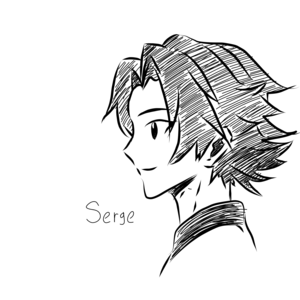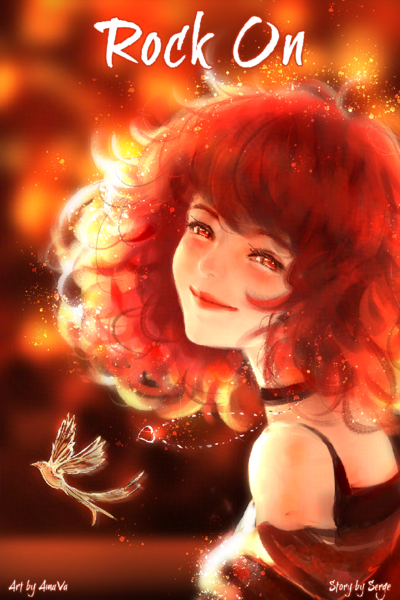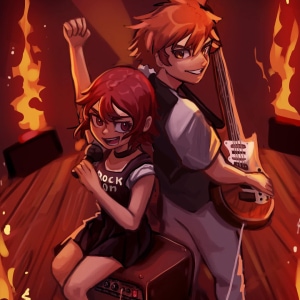The lights dimmed.
Louis opened his eyes.
The conductor stood at the podium, baton raised — sharp as a blade, quiet as a breath. The silence stretched. Then—
A downbeat. The violins surged. Cellos hummed beneath. The music opened like the first breath after a dream.
Louis inhaled. His fingers moved instinctively, guiding the upright bass into the swell of harmony. His part was subtle — deep, grounding — the kind of sound you didn’t notice unless it vanished.
“Serenade for Strings in E Major, Op. 22.”
It was beautiful.
And yet, as the notes unfurled, Louis felt like a passenger in his own performance.
Every stroke of the bow, every shift in tempo — precise. Perfect, even. But hollow. He didn’t feel the melody in his chest the way he used to. Not like when he played other music. Louder music. Messier. Alive.
He wondered if anyone noticed the difference.
Or if he was just good at pretending this still mattered.
The stage faded.
In his mind, the concert hall dissolved, replaced by floodlights and a roaring crowd. Their screams rose like thunder, fists pumping in time with some invisible downbeat. Guitars howled in the air like wolves.
Then — silence. The crowd vanished. The world dimmed.
He stood alone.
A thin door waited behind the curtain. Light spilled from the crack beneath.
Louis pushed it open.
Beyond lay a soaked alleyway — graffiti-slick walls, old concert posters melting under the rain. A red string snaked across the pavement, half-buried in the runoff.
He followed it.
The path led him through ruined stages and broken guitars. The rain intensified. The thread pooled near a doorstep.
There she was.
A girl, curled tight against the wall, shoulders shaking. Her hair hung in soaked strands, her face tucked into her arms.
Why is she crying? Who left her here?
Louis reached out, called to her — but the closer he stepped, the more she faded. Like a dream pulling away from the waking mind.
And then—
The concert hall returned.
He was on the final note. His bow slowed, lingering just enough to ache.
Silence followed. Then applause — a sudden crash of it, loud and clean.
The conductor turned to the crowd with a triumphant smile. The orchestra stood. Louis followed, bowing low.
He smiled, but it didn’t reach his chest.
He carried the bass offstage, set it gently on the rack.
Then walked outside into the night.
The air was cool and quiet, still humming with the echo of performance. Streetlights shimmered on wet pavement. Somewhere down the block, a violinist busked alone beneath a flickering sign.
Louis let out a breath. Not relief. Not pride. Just… breath.
The performance had gone well. Technically.
No missed cues. No stumbles.
And still—
It sounded perfect. It felt empty.
He’d practiced for this for months. But he couldn’t remember a single note he just played.
His fingers twitched at his sides, like they were itching for a different song. One that wasn’t written by dead composers and measured in metronome clicks.
He used to play with feeling. With weight. Back when it meant something.
But that was a long time ago. And besides, that kind of music wasn’t allowed anymore.
“Louis!”
He turned.
Roxanne jogged up the steps toward him, curls bouncing in the streetlight. Her smile was bright, her tone full of lightness — but her eyes were somewhere else.
“You were incredible,” she said. “You looked like a total pro up there.”
He gave her a soft smile. “Thanks. I’m glad you came.”
“I always come,” she said. “Even when I don’t totally get the genre.”
He laughed under his breath. “Still not a strings girl, huh?”
“Not unless it’s in a horror soundtrack,” she teased. “But hey—” she reached into her bag, but he beat her to it.
He pulled a small charm from his pocket — a silly cat with a (•ㅅ•) face — and handed it to her.
Roxy blinked, surprised. “You remembered.”
“You liked it when we saw it,” Louis said. “Figured it’d make you smile.”
She turned the charm over in her hand, slowly.
“You’re always so thoughtful,” she said. “Too thoughtful, maybe.”
He didn’t know what to say to that.
She hugged him lightly. “Text me later?”
“Yeah,” he said.
She turned and disappeared into the dispersing crowd.
The next day at the conservatory, Louis stepped into the rehearsal room and was met with the usual controlled chaos.
Emma sat on her stool, boots kicked up on a case, practicing vibrato with one hand and scrolling her phone with the other. Jonas leaned against the piano, tuning his bass like it owed him money.
“Hey, superstar,” Jonas called. “You sleep in your tux?”
“Still more fashionable than whatever that is,” Louis said, nodding to Jonas’s banana-patterned hoodie.
Emma laughed. “You killed it last night. Crowd was loving you.”
“Thanks,” Louis said, making his way to the sheet music cabinet.
Jonas raised an eyebrow. “You’re already back to practicing?”
Louis shrugged. “Just wanted to try something new.”
He held up a copy of Symphony No. 2 – “Resurrection”.
Jonas groaned. “Why are you like this?”
Emma tilted her head. “I’m game. Mahler’s dramatic as hell. Feels like dying and ascending all in one breath.”
“Exactly,” Louis said, handing them the parts. “But let’s skip the funeral march. Just this section.”
They played. The sound filled the room — big, swelling, imperfect. It didn’t fix anything, but for a moment, it gave the silence a shape.
Later that evening, Louis walked the edge of downtown. The sky was fading into gold and deep plum, the city glowing like a half-forgotten memory.
He passed shuttered venues with rusted locks and torn posters. Signs with peeling government stamps read:
“Prohibition of Rock and Metal Enforced.”
“IRIS Corp Monitoring In Effect.”
He paused in front of one poster. A girl screaming into a mic, her image warped by rain and time.
He kept walking.
A charm shop caught his eye — full of strange little trinkets, dusty baubles, and paper fortunes. In the window: a blue rose with a stem shaped like an eighth note.
He stepped inside. The air smelled like old cedar and melted wax.
When he came out, he wasn’t looking where he was going — and bumped straight into someone.
The charm slipped from his hand.
“Oh—sorry!” they said at once.
“I’ve got it,” the girl said, bending down.
She picked up the charm, turning it over in her hand before returning it to him.
“That’s cute,” she said. Her voice had a rasp to it — not rough, just lived-in. “Kind of tragic, but still cute.”
Louis blinked.
Her hair was red, short and wild like fire in motion. Her eyes had that look — like she saw through him in a single glance.
“I’m Louis,” he said, caught off guard.
“Sona.” She smiled. “You into music?”
He nodded, still stunned. “Yeah. This was a last-minute gift. For someone I care about.”
“They’re lucky,” she said.
She lingered for half a beat longer, then turned with a two-finger wave. “Later.”
And she was gone.
Louis stood there, the charm still in his hand, pulse a little faster for reasons he didn’t understand.
The lake shimmered as the sun dipped beneath the skyline. Wind rustled the trees. Roxanne sat on a bench, watching the water ripple like fire.
Louis approached. “Hey.”
She stood. “Let’s walk.”
They moved in silence. The kind that used to feel comfortable. Now it just felt final.
“I’ve been meaning to say something,” she said.
Louis didn’t answer.
“I don’t think we should keep pretending this works.”
She didn’t cry. She didn’t raise her voice. But it hit harder than if she had.
“I care about you,” she said. “But I don’t feel the same anymore. I’ve tried. I thought maybe if we kept going, something would come back.”
Louis kept his eyes on the path. “So that’s it?”
“I think you already knew,” she said. “You just didn’t want to be the one to say it.”
He stopped walking. “You think I play that music because I love it?”
Roxanne turned to face him.
“I don’t,” he said. “I used to play something else. A long time ago. I don’t even know why I stopped.”
“You played it for me,” she said. “And that’s what makes this so hard.”
Her voice cracked, just slightly. “You gave up something real for someone who couldn’t give it back.”
She stepped forward, touched his sleeve.
“You’re going to be amazing, Louis. But not with me.”
Then she let go.
He didn’t call after her. Didn’t cry.
He just watched her walk away.
He sat on the bench and stared out at the water until the sky turned navy. His hands ached.
His phone buzzed.
Mark: You coming home for dinner?
He called.
“…Hey. Can you pick me up?”
Half an hour later, a cruiser rolled up to the curb.
Mark stepped out, uniform jacket slung over one shoulder.
“You okay?” he asked.
Louis gave a small nod.
Mark didn’t say anything else. Just sat beside him, waiting.
“It was Roxy,” Louis said eventually. “She broke it off.”
Mark let out a slow breath. “I’m sorry.”
“She said I stopped being myself,” Louis added. “Thing is… I don’t know who that even is anymore.”
Mark looked out over the lake.
“You don’t have to know yet,” he said. “You just have to keep going until you do.”
Louis didn’t answer, but his shoulders relaxed.
They sat like that for a while — two brothers, two different silences — until the cold started to creep in.
“C’mon,” Mark said. “I’ll drive.”
Far across the city, beneath a rooftop bathed in silver light, Sona stood alone.
A cigarette burned low between her fingers.
“The preparations are finished, ma’am,” said a voice from the stairwell.
She didn’t turn. “Good. Have the roadies spread the word for Saturday.”
“Yes ma’am.”
The door shut.
Sona crushed the cigarette under her boot and looked up at the sky, eyes sharp and distant.
A storm was coming.
And in the quiet of that night, beneath the glow of a single silver light, the story began.
The story of a band called Rock On —
and the story of the greatest and best song in the world.











Comments (0)
See all